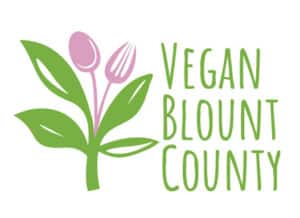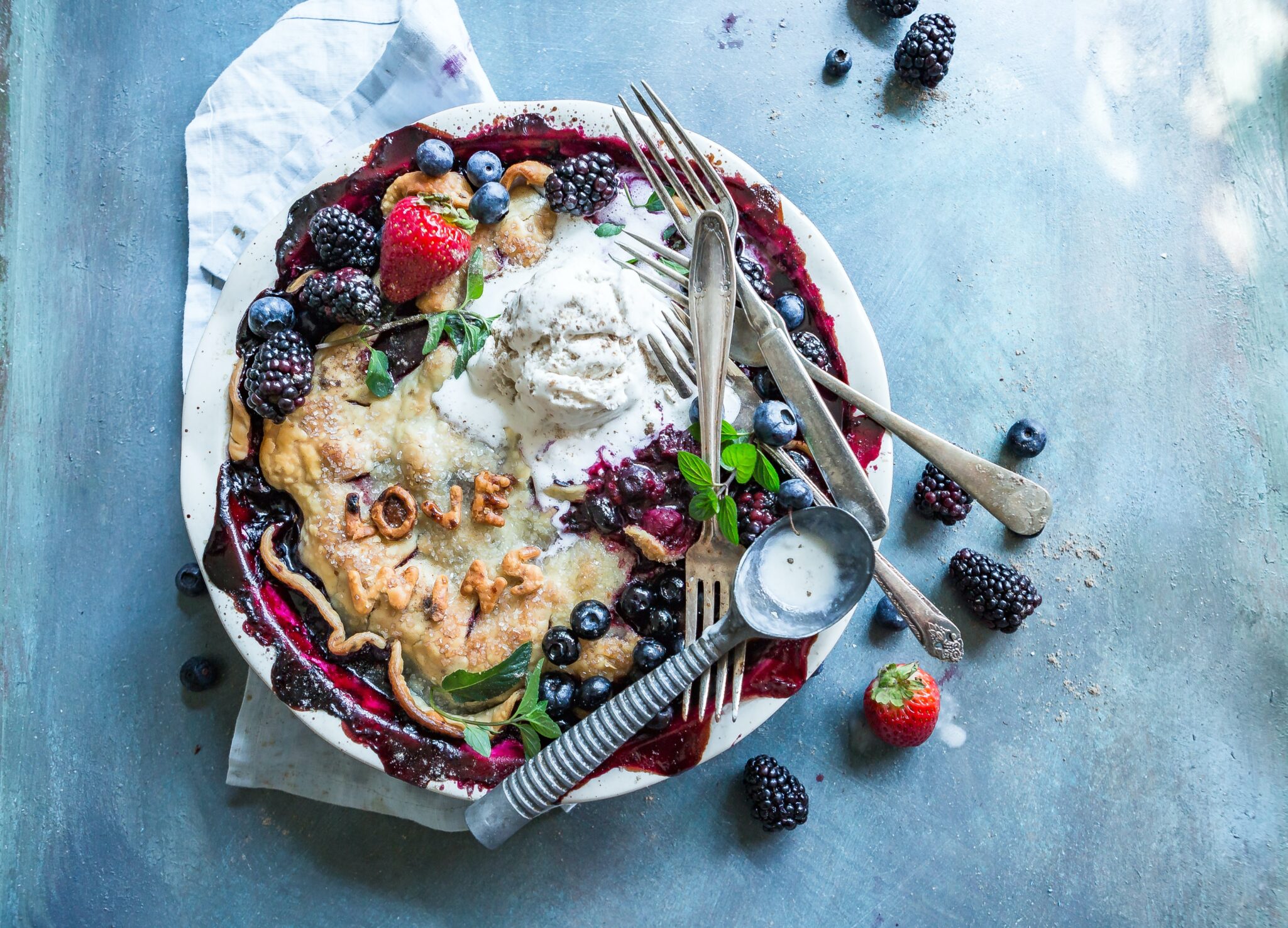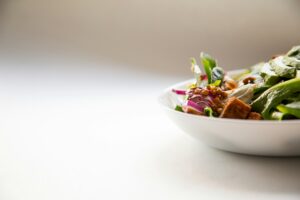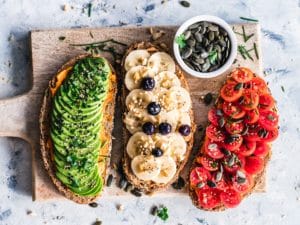- How To Learn From Melanie Joy’s Enlightening Concept of Carnism To Improve the World - June 24, 2024
- Unwrap Compassion: Unique Gifts for Vegans That Inspire and Delight - December 11, 2023
- Enjoy The Delightful Plant People Boutique: Beautiful Plants and Lovely Snacks - November 20, 2023
Yes, you can have a wonderful traditional, Paleo, gluten-free, and vegan Thanksgiving. Breaking bread together can be joyful. But people hold fiercely to their food choices, whether that’s religious preferences, nutritional goals, or philosophical beliefs about their diet. And some people have life-threatening food allergies.
On Thanksgiving Day, we must consider these preferences for those we love (and the guests of those we love.)
A considerate host can still serve turkey and favorite dishes. This post is about ways to be gracious hosts or guests without sacrificing family traditions.
I’ve experienced the “ugh, you’re a vegan, what do I do now?” frustration, so I try to be flexible and grateful to my host. But vegans are not the only ones with food requirements. The variety of food preferences and restrictions is wider than you might expect.
In the next section, I review the various allergies, intolerances, and preference people may hold. But don’t cancel your dinner yet because I will also suggest ways you can navigate the meal successfully.
Allergies, Intolerances, and Preferences
Food Allergies
Food allergies can be deadly. Allergies to peanuts, tree nuts, fish, and shellfish are usually the most severe.
My husband has life-threatening allergies to peanut products and legumes. It is easy to manage this at home and in restaurants. But potlucks are difficult. Someone using the chocolate brownie knife to cut the peanut butter brownies can send him to the emergency room. We both carry Epi-Pens, but that only holds off the reaction until we can get to the hospital for treatment. So, he brings his own food to potlucks because he does not expect others to know how to deal with the potential dangers.
Food Intolerances
Food intolerances to lactose or gluten are not as severe as allergies but can also be serious.
Diets
Your guests may be on special diets to improve their health. For example, the Paleo Diet allows meat, fish, eggs, vegetables, fruits, nuts, seeds, herbs, healthy fats, and oils. But you can’t eat processed foods, sugar, soft drinks, grains, most dairy products, legumes, artificial sweeteners, vegetable oils, margarine, and trans fats.
Religious Dictates
Religious tenets may dictate food choices. For example, eating Kosher means complying with dietary laws regarding food and its preparation. Muslims have Halal, with similar standards to Kosher.
Food Preferences
If all the above isn’t complicated enough, we come to food preferences, such as my example of being a vegan Thanksgiving guest.
- Pescatarians eat fish but not meat.
- Vegetarians avoid meat but will eat dairy products and eggs.
- A vegan Thanksgiving meal does not include meat, dairy products, or eggs.
What a list, right? Now, before you decide you are never again going to host a meal, go back to the reason you wanted to do so. You are creating welcoming fellowship over food, and that is a gift. And it doesn’t have to be stressful.
Remember, it is just one meal.
Tips for Thanksgiving Hosts
We should try to please our guests but doing that for everyone is likely impossible.
“Having someone over is such a lovely thing to do and you don’t need to make everything yourself to extend that invitation. Ask your guests to bring a dish they love so you can be sure they’ll have something to enjoy, plus you might learn about a new dish along the way.” – Julia Turshen, author of Simply Julia: 10 easy recipes for healthy comfort food
Turshen suggests these ideas for accommodating dietary restrictions.
- Ask ahead: Check with each diner and ask if they have any allergies, intolerances, or preferences. If it is easy to accommodate guests, try to do so. If you cannot handle their requirements, go to number 2.
- Ask for help: Ask them to bring their favorite dish. Be open to people bringing their own food. Welcome that. It makes your life easier.
- Inform your diners: Make an announcement about each dish’s ingredients or put ingredient cards in front of the food.
If someone has a severe food allergy, let them know that you want to protect them from harm. But if you can’t completely control the menu, ask them to bring a dish they love. I know hosts that would think this is rude but someone with severe food allergies will appreciate it.
But preferences are a different matter. For example, I am a vegan and have strong preferences about my eating choices. But I also understand the eating choices of others, and that makes holiday dinner very complicated. Being a good host means trying to please your diners, but that doesn’t mean creating an entirely vegan meal for one vegan. If you had a guest that was eating gluten-free, would you make the entire meal gluten-free? No.
Accommodation Ideas
 One way to accommodate multiple preferences is to separate ingredients and let diners build their own meal. An example is roasted vegetables with a balsamic sauce. Keeping the components separate allows you to satisfy more diners (not everyone loves roasted Brussels sprouts.) That’s good for everyone.
One way to accommodate multiple preferences is to separate ingredients and let diners build their own meal. An example is roasted vegetables with a balsamic sauce. Keeping the components separate allows you to satisfy more diners (not everyone loves roasted Brussels sprouts.) That’s good for everyone.
Swapping out a few ingredients can really help your diners. For example, making traditional dishes vegan is easier than you think. Swap out vegan butter or margarine for regular butter in your recipes. Use vegetable broth instead of meat-based broth in your stuffing. Each Thanksgiving, I prepare vegan versions of classic dishes such as mashed potatoes, gravy, sweet potato casserole, fruit pie, and even green bean casserole. If you are interested in excellent vegan Thanksgiving recipes, try these from Happy Cow.
Consider how you offer the food. A buffet is a good choice, especially if you ask those with allergies to go first. You can also prepare a separate plate for those with special needs.
Attending Someone Else’s Dinner
If you are a guest, don’t make demands but be upfront with the dinner host about your preferences. Mainly, prepare them for your choice not to eat some of the dishes offered.
Offer to bring a dish that makes you happy and may show other diners how delicious different types of meals can be. For example, I bring a fantastic vegan dish to gatherings. My mock tuna salad on crackers appetizer is a hit.
Allowing others to bring their favorite dishes is a way to learn about new foods and can be a wonderful conversation topic.
Tips for Everyone at Thanksgiving Dinner
Remember that the point of a Thanksgiving dinner is sharing fellowship and gratitude. Focus on that even if you can’t eat many of the dishes. It is just one meal. Please do this for the host who opened their home to you.
Don’t ask others why they are or are not eating a particular food. These are potentially tricky issues to talk about at a communal meal. A person may not be eating turkey because they had recent surgery and must avoid it. Another may not eat a dish because of a religious tenet they don’t want to discuss during this meal.
My answer to “Why aren’t you eating the turkey?” would be an unpleasant discussion at a Thanksgiving meal. Talking about veganism at a dinner where people eat meat is not ideal, for them or me. My strategy is to dodge the question. But some people keep asking questions or trying to make me eat meat. If I talk about being vegan, I don’t go into details about my ‘why,’ which is avoiding animal cruelty. If people are interested in my reason, they talk with me privately. I’ve had lovely conversations about becoming vegan or how to accommodate family members who want to be vegan.
Of course, sometimes, a person drinks too much and starts asking rude questions or jokes to get attention. Have a pivot ready for this. For example, if tipsy Uncle Sid gives you grief about avoiding alcohol, ask him a question that avoids his topic but keeps him the center of attention. For example, “Sid, Betty told me you like to play golf. What is the funniest thing that ever happened on the course?”
A person may see the communal meal as a place to educate others about what they should eat. That might look like Don commenting about how the high saturated fat contact of the meal means our arteries are getting clogged. Then discussing his open-heart surgery and how he is now on the Pritikin diet, and everyone should eat that way.
You can acknowledge Don and move the conversation to another setting with a pivot. For example, say, “Excuse me, I want to make sure everyone has what they need to drink. Don, will you talk with those who want to know more about your ideas after dinner in the family room? Now, Fred, may I top up your glass?”
Being Thankful is Good For You
On Thanksgiving, focus on being grateful. I never expect hosts to cater to my diet, but I’m so grateful when they do so. It feels wonderful when people care about me and help me feel welcome.
And gratefulness is good for us.
- It has a positive impact on wellbeing, resilience, and life satisfaction.
- It reduces anxiety, stress, and depression.
- Gratitude also expands, because folks who receive appreciation pay it forward to others.
Have a wonderful Thanksgiving.
READ NEXT
Sustainable Diets: How To Make a Difference for the Planet
Why You Should Celebrate World Vegan Day Even if You Eat Meat
At the Intersection of Thanksgiving and a Vegan Rapper
Bluetick Tavern Offers Vegan Comfort Food




